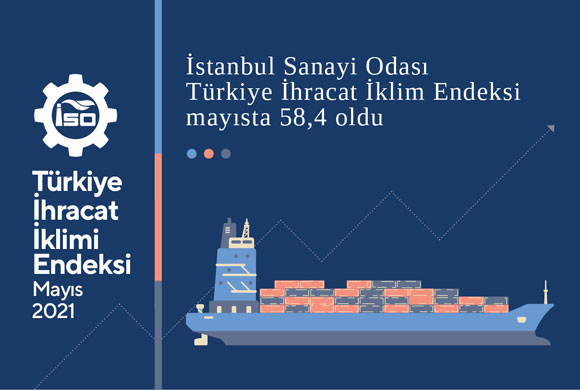ICI Türkiye Export Climate Index for May Released
- 08.06.2021
- News

Measuring the operating conditions in the key export markets of the Turkish manufacturing sector, the Istanbul Chamber of Industry (ICI) Türkiye Manufacturing Export Climate Index rose to 58.4 in May, pointing to a significant improvement in demand conditions in Turkish manufacturing sector exporters. In fact, the rate of improvement was one of the most marked since the series began in January 2002, only just short of the record posted in June 2006.
Some key export markets registered unprecedented increases in business activity during May as demand ramped up. In the UK, output rose at the fastest pace since at least January 1998, while growth in the US was even stronger. Record increases were seen in Ireland, the Netherlands and Austria. There were also signs of much stronger demand conditions in Russia, Poland and the Czech Republic midway through the second quarter.
The Istanbul Chamber of Industry (ICI) Türkiye Manufacturing Export Climate Index, which measures the operation conditions in the key export markets of the Turkish manufacturing sector, announced the results of the index for May 2021. In the index, the figures above the 50.0 no-change mark signals an improvement in the export climate, while the figures below signals deterioration.
The Istanbul Chamber of Industry Türkiye Manufacturing Export Climate
Index posted 58.4 in May, up from 56.0 in April and signalling a substantial strengthening in demand conditions for Turkish manufacturing exporters. This rate of improvement was one of the most marked since the series began in January 2002, only just short of the record posted in June 2006. Some key export markets registered unprecedented increases in business activity as demand ramped up.
Record increases in Europe and the US
In the UK, output rose at the fastest pace since at least January 1998, while growth in the US was even stronger. Combined, these two economies account for around 13% of exports of Turkish manufactured goods. An improving demand picture was also signalled in the eurozone in May. All eight Euro area nations for which PMI data are available saw rates of expansion in business activity accelerate from the position in April. Record increases were seen in Ireland, the Netherlands and Austria. There were also signs of much stronger demand conditions in Russia, Poland and the Czech Republic midway through the second quarter.
Mixed trends in the Middle East, while Latin America struggled due to the COVID-19 pandemic
In the Middle East, Saudi Arabia posted a sharp and accelerated rise in activity during May, with growth the fastest in almost three-and-ahalf years. On the other hand, rates of expansion in the UAE and Qatar eased to three- and 11-month lows respectively, while reductions in output were signalled in Egypt and Lebanon. Parts of Latin America continued to struggle due to the impacts of the COVID-19 pandemic. Colombia posted a steep decline in output, while Mexico remained deep in contraction territory. There were some signs of stabilisation in Brazil, but demand conditions there still deteriorated marginally.
Asia affected negatively from the impacts of the COVID-19 pandemic
The recent severe outbreak of the pandemic in India also resulted in a contraction in activity, ending an eight-month sequence of expansion. Other Asian economies also suffered with renewed outbreaks of COVID-19, often leading either to slower growth rates or outright reductions in activity.
Commenting on the Istanbul Chamber of Industry Türkiye Manufacturing Export Climate Index, Andrew Harker, Economics Director, IHS Markit, said: “Different continents are telling different stories in terms of the strength of demand for Turkish manufacturing exports at present. In Europe and North America business activity is ramping up, in a number of cases at unprecedented rates amid a loosening of restrictions and successful vaccination campaigns. These improvements were central to a near-record improvement in the export climate during May. On the other hand, South America and Asia continue to suffer amid renewed COVID-19 outbreaks, meaning that demand there is likely to remain subdued in the near-term at least.”